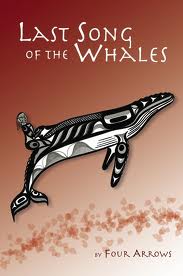Aunque ya estamos en el 2011 voy a seguir todavía poniendo algunos post sobre la conferencia AME 2010.
Esta vez quiero presentar a Four Arrows (Aka Don Trend Jacobs), de cuya existencia no tenía idea hasta antes de escucharlo el pasado Noviembre en la conferencia.
Four Arrows presentó una ponencia titulada Questioning Anthropocentrism: An Indigenous Perspective on Authentic “Moral” Education. Me llamó la atención el título y entré a escucharlo. Su presentación trató, en resumidas cuentas, de analizar críticamente el excesivo rol que se le ha dado a los seres humanos en el mundo, en detrimento de otros seres no humanos (animales, plantas) que podrían enriquecer la visión que se tiene actualmente acerca de la ética y la educación moral pues, desde una perspectiva indígena (Four Arrows es Cherokee/Creek), las grandes virtudes (generosidad, paciencia, coraje, honestidad, humildad) fueron enseñadas a los humanos por los animales. Un artículo acerca de este tema es el siguiente (con enlace para descargarse):
Four Arrows, Jessica London Jacobs, Sage Ryan (2010). Anthropocentrism’s Antidote: Reclaiming Our Indigenous Orientation to Non-human Teachers. Critical Education, 1 (3).
El artículo puede descargarse aquí. Abajo incluyo el abstract:
Abstract
This semi-dialogic essay argues that the traditional wisdom of Indigenous Peoples must supplant the reification of human centeredness currently existing in Western education, if we are to restore social and ecological balance in the world. Our father-daughter grandson reflections may help to illuminate the epistemology of our assertions and research conclusions. Such authorship represents the multi-generational approach to teaching and learning typical in traditional Indigenous cultures. We begin by attempting to explain how and why dominant rhetoric regarding diversity is delusional and dangerous. We then offer specific ideas for how Western schooling can move toward a more authentic understanding that is the basis for indigenous education; one that embraces a non-hierarchical philosophy about sharing, connecting to and learning from the non-human ecology that surrounds us.

En esta misma línea se inscribe el libro Last Song of the Whales, una novela poblicada por Savant Books en Honolulu y respaldada por The Cousteau Society, cuyas ganacias beneficiarán a la Algalita Marine Research Foundation, la que está documentando el impacto del plástico en los océanos. Copio una reseña:
The book is about “a remarkable partnership between whales and man, intended by the whale to conquer the growing plastic debris problem,” the author wrote. “I really want to raise consciousness with this book about this issue as well as raise funds for Algalita’s research on this issue. … I sincerely hope my first work of fiction will have a significant impact on helping us return to a balanced way of living by remembering our non-human teachers.”
In “Last Song,” a humpback whale mysteriously takes a mixed-blood American Indian professor to sea. While struggling to survive and learning to communicate with a pod of whales, the man rediscovers his indigenous roots. In the process, he learns that thousands of whales may be on a suicide mission in the North Pacific in an effort to end human pollution of the ocean. However, when he realizes the dire effects the whales’ actions could have for all of life on Earth, he and the whale work together – against all odds – to warn the world in time.
Wahinkpe Topa, or Four Arrows, is the Native name of Dr. Don Trent Jacobs, former dean of education at Oglala Lakota College and currently a professor of educational leadership at Fielding Graduate University. He is the author of 19 non-fiction books on topics related to indigenous worldviews, education, critical thinking, social/ecological justice, human rights and wellness. He received the 2004 Martin-Springer Institute Moral Courage Award for activism.

Un libro reciente (Noviembre 2010) que también quiero anunciar es este (abajo del título va un comentario extraído de la página de la editorial):
Differing Worldviews in Higher Education: Two Scholars Argue Cooperatively about Justice Education (By Four Arrows and Walter Block)
Two noted professors on opposite sides of the cultural wars come together and engage in “cooperative argumentation.” One, a “Jewish, atheist libertarian” and the other a “mixed blood American Indian” bring to the table two radically different worldviews to bear on the role of colleges and universities in studying social and ecological justice. The result is an entertaining and enlightening journey that reveals surprising connections and previously misunderstood rationales that may be at the root of a world too polarized to function sanely.
“How refreshing to read a debate between a libertarian and a progressive where the participants are not trying to one-up each other or score debating points but simply trying to present an intellectually rigorous case for their philosophy, respectfully debate their differences, learn from each other, and hopefully find common ground.” –Dr. Ron Paul, (R) Congressman, 14th District, TX
Pienso que el trabajo de Four Arrows es sugerente, aunque obviamente no está libre de polémicas. Algunos de los que lo escucharon en Noviembre encontraron conexiones entre su discurso y posturas católicas como la de San Francisco de Asís. Por supuesto, dotar de conciencia moral a los animales es algo que muchas personas se resisten a aceptar, sobre todo si entienden que las decisiones morales que realizamos en la vida requieren de deliberación y principios éticos construídos y tienen poco que ver con automatismos y procesos inconscientes inherentes a la mayoría de animales (yo misma apoyo esta visión de lo moral, ver por ejemplo, este post).
Más información sobre estos trabajos y sobre Four Arrows, en su página web: http://www.teachingvirtues.net/
